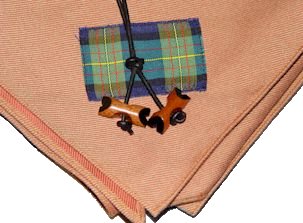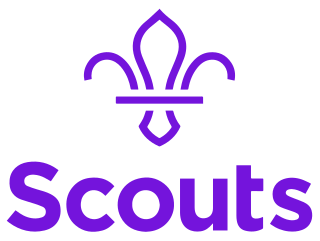
Wood Badge is a Scouting leadership programme and the related award for adult leaders in the programmes of Scout associations throughout the world. Wood Badge courses aim to make Scouters better leaders by teaching advanced leadership skills, and by creating a bond and commitment to the Scout movement. Courses generally have a combined classroom and practical outdoors-based phase followed by a Wood Badge ticket, also known as the project phase. By "working the ticket", participants put their newly gained experience into practice to attain ticket goals aiding the Scouting movement. The first Wood Badge training was organized by Francis "Skipper" Gidney and lectured at by Robert Baden-Powell and others at Gilwell Park in September 1919. Wood Badge training has since spread across the world with international variations.

Scouts UK (also known as The Scout Association) is the largest Scout organisation in the United Kingdom. It's the World Organization of the Scout Movement's recognised member for the United Kingdom.

A King's Scout is a Scout who has attained the King's Scout Award. The King's Scout Award is the highest youth award achievable in the Scouting movement in the Commonwealth realms, including the United Kingdom, Canada, Australia, and New Zealand, where Scouts operate under the patronage of King Charles III. Whether the award recipient is a Queen's or King's Scout depends on who is the current monarch of the Commonwealth realms.
The Duke of Edinburgh's Award is a youth awards programme founded in the United Kingdom in 1956 by the Duke of Edinburgh, which has since expanded to 144 nations. The awards recognise adolescents and young adults for completing a series of self-improvement exercises modelled on Kurt Hahn's solutions to his "Six Declines of Modern Youth".

Explorer Scouts, frequently shortened to Explorers, is the fifth section of The Scout Association in the United Kingdom for 14- to 18-year-olds. The section was introduced in 2001 and formally launched in February 2002, alongside Scout Network, to replace the former Venture Scout section for fifteen-and-a-half to twenty-year-olds.

Scouts South Africa is the World Organization of the Scout Movement (WOSM) recognised Scout association in South Africa. Scouting began in the United Kingdom in 1907 through the efforts of Robert Baden-Powell and rapidly spread to South Africa, with the first Scout troops appearing in 1908. South Africa has contributed many traditions and symbols to World Scouting.
Venturer or Venture Scouts are programs in some Scouting organisations for young people of various age ranges in the 14–20 age range. A participant in the program is called a Venturer.

Rover Scouts, Rovers, Rover Scouting or Rovering is a program associated with some Scouting organizations for adult men and women. A group of Rovers is called a 'Rover Crew'.

Gaisce – The President's Award is an award in Ireland, earned by young people between the ages of 14 and 25 for participating in several activities for a certain period. There are three awards: bronze, silver and gold.

Scouts, often referred to as the Scout section to differentiate itself from the wider movement and its parent organisation, is a section of Scouting run by The Scout Association for ten and a half to fourteen year old young people. The section follows on from Cub Scouts and precedes Explorer Scouts. Since 1991, the section has been coeducational and today the Scout section accepts young people from all backgrounds, faiths and genders.

Cub Scouts or Macaoimh is the name given to youth members Scouting Ireland and previously Scouting Ireland (CSI), of the Cub Scout age group. The National Team Lead and Programme Commissioner for Cub Scouts is Evan O'Connell of the 49th Cork, Ballincollig Scout group. The terms Macaoimh and Cub are often co-existent though Macaoimh represents a different tradition. Both boys and girls participate in the Cub Scout programme though some Scout Groups are boys only. Its membership is the largest of the four Scouting Ireland Sections. The Cub Scout programme is part of the worldwide Scouting movement and aims to develop the youth member using the SPICE program - Social, Physical, Intellectual, Character, Emotional and Spiritual.

Venture Scouts in Scouting Ireland are aged between 15 and 17 years of age. The awards scheme of Venture Scouts is called Rogha, an Irish word meaning Choice. Although many groups use Gaisce, the President's Award, as part of their programme also. Each group has a Venture Scout Executive which, under the guidance of an adult Scouter, designs and implements activities.

Scouts in Scouting Ireland are aged between 11 and a half to 16 years of age. Each group has a Court of Honour/Patrol Leader's Council which under the guidance of an adult Scouter designs and implements activities. Scouts is the section where activities begin to really challenge the youth member and impart responsibility and self-reliance in accordance with the Scout method and the educational philosophy of Baden-Powell. The organisation also currently has Sea Scout and Air Scout programmes. The highest award is the Chief Scout Award.

Beaver Scouts are the youngest age group in Scouting Ireland, being boys and girls aged between 6 and 8 years of age. The personal progressive scheme is broken down into three stages 'Bree' 'Ruairc' and 'Conn', while Adventure skills, Special Interest Badges and the Chief Scout Award also form part of the progress scheme.
The Chief Scout is the leader of Scouting Ireland. As Chairperson of the National Council and National Management Committee the Chief Scout is responsible for co-ordinating the activities of the Association with the help of the National Team for Policy Implementation and Co-ordination. The role is a volunteer one, normally elected every third year at National Council, and works with the CEO, the head of the professional staff function of the association.

Sea Scouting has existed in Ireland since 1912 and is a programme framework within Scouting Ireland.

The Baden-Powell Award, also known as the B-P Award or Baden-Powell Scout Award (BPSA), is the highest award achievable to Rover (adult) Scouts.
The Israel Youth Award is a self-development program for 14- to 25-year-olds. Over 7 million young people worldwide have taken up the Award challenge. A member of the International Award Association, the Israel Youth Award is one of 62 National Award Authorities delivering the International Award, which started life in the UK in 1956 as The Duke of Edinburgh's Award.
The Explorer Belt is an award available to Rover Scouts in Irish Scouting. Over the last 43 years, over 2,000 Venture and Rover Scouts have gone on Explorer Belt Expeditions. Ireland's Explorer Belt is recognised as being one of the most challenging yet ultimately rewarding activities in Scouting. The Explorer Belt was traditionally linked to the Venture Scout Section but since the introduction of ONE Programme, and the standardisation of age ranges the Explorer Belt is now a Rover Scout event and participants must be over the age of 18. A similar award is available in other Scout associations around the world.

The ONE Programme personal progression system for youth members of Scouting Ireland has been designed and refactored since the merger of earlier organisations, using a number of key underlining principles. Activities and personal progression (badges) are designed to make use of the Scout method, maintain a consistent structure across the five youth programme sections, involve youth participation and personal experiences.













